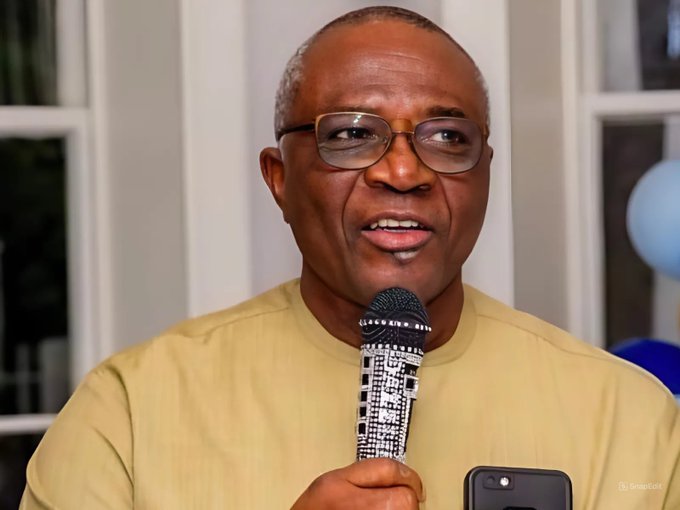The Presidency has responded strongly to former Vice President Atiku Abubakar’s criticisms of President Bola Ahmed Tinubu’s economic policies, accusing him of failing to provide effective leadership even within his own party.
Atiku, who ran as the People’s Democratic Party (PDP) presidential candidate in the 2023 election but lost to Tinubu, described the current administration’s policies as “trial-and-error” and blamed them for Nigeria’s economic woes.
In his criticism, Atiku labeled Tinubu’s approach as a “palliative economy,” arguing that implementing multiple reforms simultaneously—such as raising electricity tariffs, adjusting exchange rates, and removing petrol subsidies—is causing unnecessary suffering for Nigerians.
The former Vice President stressed that his administration would have adopted a gradual approach to subsidy removal, drawing examples from gradualist strategies seen in Malaysia and Indonesia.
However, Bayo Onanuga, Special Adviser to President Tinubu on Information and Strategy, dismissed Atiku’s criticism as lacking substance and reminded the public that Nigerians had already rejected his vision in the last election.
In a more recent response, Dada Olusegun, the President’s Special Adviser on Social Media, took a direct shot at Atiku, calling his criticism hollow and pointing to Atiku’s inability to manage his party effectively.
“You weren’t elected, Alhaji,” Olusegun said in a statement. “You can’t even unite your party with only 13 governors. You can’t provide proper leadership to be considered a serious opposition.”
Atiku’s criticism comes at a time when the PDP is struggling with internal conflicts, largely due to a rift between Atiku and former Rivers State Governor Nyesom Wike. This division surfaced during the 2023 PDP primary, where Atiku emerged as the candidate despite significant opposition within the party.
In a statement he personally signed, Atiku criticized Tinubu’s administration for implementing “overkill” reforms that have deepened economic hardship.
“We would have been more strategic in implementing reforms,” Atiku said. “My administration would have planned better and consulted more widely to protect Nigerians from these harsh economic impacts.”
The opposition leader emphasised that his approach would have involved a gradual reduction of subsidies, which he argued is more sustainable.
“My journey of reforms would have benefited from more thorough assessments, more stakeholder consultations, and better planning,” he said. “We would have protected our economy from the risk of collapse by preventing business failures.”
Atiku further argued that his economic agenda, encapsulated in his policy document My Covenant With Nigerians, would have been more robust and people-centered.
He criticized the current administration’s abrupt approach, noting that an effective economic plan should consider the weaknesses of Nigerian institutions and the complexities of implementation.
“At this moment, Nigerians are suffering because of Tinubu’s trial-and-error economic policies,” Atiku stated.
In a pointed criticism, Atiku said, “We would not have pursued reforms that overestimate their benefits and underestimate the costs.”
He highlighted his commitment to “leading by example,” noting that any fiscal reform to save public funds must begin with eliminating revenue leakages within government institutions.
According to Atiku, his approach would have been marked by a balance of strategic social support and long-term reforms aimed at real economic stability.
“We would have implemented a robust social protection program to offer genuine relief to the poor and vulnerable,” he said. “I would not be leading a ‘palliative economy’ while leaving Nigerians to fend for themselves.”
Atiku also outlined several specific measures he would have taken if elected, including the launch of an Economic Stimulus Fund (ESF) with an initial investment of approximately $10 billion to support micro, small, and medium-sized enterprises (MSMEs) across various sectors.
Additionally, Atiku proposed a skills-to-job program targeting Nigeria’s unemployed youth, including graduates, early school leavers, and uneducated youth.
“I have always supported the removal of subsidies, as their administration has been marked by corruption,” he said. “However, we would have taken a gradual approach, as we did during my time as Vice President, where reforms were introduced in phases.”
Atiku’s criticism of the subsidy removal stems from his view that the current administration’s approach lacks foresight and is causing widespread hardship. He argued that removing subsidies without a stable exchange rate and adequate measures in place is counterproductive.
As part of his proposed strategy, Atiku suggested that Nigeria should focus on revitalizing its refineries and aim to refine at least 50 percent of its crude oil domestically, thereby reducing dependence on imported petroleum products.
“We are the most inefficient OPEC member in terms of refining capacity,” he noted. “If we had invested in refining infrastructure, we would not be in this situation today.”
Atiku’s response to Tinubu’s policies reflects his belief that the current administration’s reforms were poorly timed and insufficiently considered.
“The gradualist approach is crucial,” Atiku said. “Many European countries have taken five years to phase out subsidies fully. A hasty removal without adequate preparation does more harm than good.”

